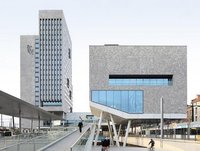

Download programme
Link to registration (online registration for free)
What will you gain:
|
Day 1:What is science based advice, and how is it used?
What are the pitfalls and how do we overcome them?
|
Day 2:From national to international advice, what is different?
Stakeholder relations and communication
|
Experienced advisors willing to evolve and share their practice
Price (including all catering, not including transport or accommodation):
Organisers1): 120 € incl VAT
Non-organisers: 165 € incl VAT
The European Union as well as national governments have adopted ambitious climate and environmental targets for agriculture and food production
At the same time, an efficient and competitive agricultural and food sector is important for food supply and the economy.
Decisions and regulations in this field can be both complicated and conflicting. The topics of agriculture,
food, climate and the environment are therefore high on the political agenda, and there is a growing demand for scientific knowledge advising policy formulation.
In several member states, science-based advice has become the subject of heated debates. Stakeholders and lobbyists are strong and some has challenged both the policy as well as the science behind it.
This provides a new type of pressure on the researchers delivering the advice. The pressure from stakeholders and the strong political agenda has to be kept at bay, and at the same time the scientific results has to be both solid and transparent. This is not an easy task for single researchers, and strong institutional setups has been developed at some of the major European research institutes involved.
Aarhus University has a long experience in providing science-based policy advice to Danish ministries. The university hosted the first European Seminar on science-based government advice in agriculture, food, climate and the environment in March 2021. More than 200 researchers and advisers from all over Europe participated. One of the conclusions was, that there is a need to learn from each other, to share best practices and to discuss the main principles, in order to strengthen the evidence based policy development in Europe. As a result, 7 European research institutes have developed this training course, open to experienced resarchers and advisors from all of Europe.
For more information, please contact the secretariat at Aarhus University:
Anja Skjoldborg Hansen: ash@dce.au.dk
1 Organisers: DCA - Danish Centre for Food and Agriculture & DCE – Danish Centre for Environment and Energy, Aarhus University Denmark. CREA, Council for Agricultural Research and Analysis of the Agricultural Economy, Italy, WUR, Wageningen University & Research, The Netherlands, University of Zielona Góra, Poland, ILVO, Flanders Research Institute for Agriculture, Fisheries and Food, Belgium, LUKE, Natural Resources Institute, Finland, INRAE, French National Research Institute for Agriculture, Food, and Environment, France